|
|
|
Sort Order |
|
|
|
Items / Page
|
|
|
|
|
|
|
| Srl | Item |
| 1 |
ID:
131627
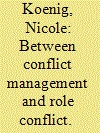

|
|
|
|
|
| Publication |
2014.
|
| Summary/Abstract |
This paper assesses the role of the European Union in the Libyan crisis (2011) and critically considers the implications for its evolution as an international security actor. Employing role theory, the paper reviews the historical development of the Union's security actorness and sheds specific light on the balance between self-conception and external expectations in the case of the Libyan crisis. Its central argument is that, despite external expectations and European narratives of a 'comprehensive power role', the Libyan crisis showed that the Union still acts in line with its traditional role as a civilian power. The inability to go beyond civilian power stemmed from internal dissonance on a potential hard power role and a corresponding lack of material capabilities. The growing gap between expectations about comprehensive actorness on the one hand and performance on the other is likely to damage the Union's future credibility as an international security actor.
|
|
|
|
|
|
|
|
|
|
|
|
|
|
|
|
| 2 |
ID:
131343
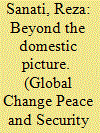

|
|
|
|
|
| Publication |
2014.
|
| Summary/Abstract |
This article examines the geopolitical determinants that have underpinned contemporary Iran-US relations, challenging the established thinking on why this relationship has been characterized by hostility. It is argued that the primacy that has been given to the role of domestic politics in either the US or Iran, as being the main arbiter of this relationship, is incomplete. This relationship is just as much a product of the structural conditions within the Middle East and the wider international system, which created the conditions for the clashing of the core national interests of both these states. However, due to the massive political and social alterations within the Middle East in the past decade, the notion of 'strategic irreconcilability' between both actors is now fundamentally changing. This has given room for a possible recalibration of the Iran-US relationship. Ultimately, it is argued that the synthesis of the domestic, the regional, and geopolitical levels of analysis are needed for a more holistic picture of the past, present, and future of Iran-US ties.
|
|
|
|
|
|
|
|
|
|
|
|
|
|
|
|
| 3 |
ID:
133578
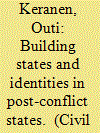

|
|
|
|
|
| Publication |
2014.
|
| Summary/Abstract |
An integral part of state formation processes is identity-building: 'making one out of many' as Walzer puts it. This is also true in terms of contemporary, internationally led statebuilding projects. This dimension of international statebuilding is important, as fundamental questions pertaining to belonging are as important to successful post-conflict process as institutional arrangements; in fact, assumptions about identities and group boundaries guide the technical decisions on institutional and governance structures. The central aim of this paper is to reflect upon identity-construction as a part of post-conflict statebuilding through exploring how historical and more recently invented symbols are deployed to construct a specific sense of belonging. The analysis finds a multiplicity of identity-building projects that advance different visions of community and belonging. The outcome is politicised and contentious visual, everyday landscape that legitimises competing local statebuilding projects (grounded in the distinctions between Bosnian peoples), while undermining peacebuilding and reconciliation. Yet, rather than indicating a primordial antagonisms or incompatible 'liberal' and 'local' norms, the conflicts over symbols (and ultimately, identities) between international and local agents are indicative of wider disagreements over how the Bosnian state ought to be organised and are fuelled by the institutional structures of the country and the weaknesses in the international statebuilding
|
|
|
|
|
|
|
|
|
|
|
|
|
|
|
|
| 4 |
ID:
129639
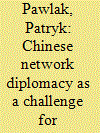

|
|
|
|
|
| Publication |
2014.
|
| Summary/Abstract |
For decades, a prevailing view has been that a very limited number of global issues can be resolved without the USA and European Union acting together. But in recent years, we have seen a growing body of scholarship addressing the question of the 'diffusion of power', 'the rise of the rest' or 'global zero'. With the financial crisis, questionable foreign policy choices and growing global competition from other international actors, both in terms of trade and ideas, the idea of the Western domination is increasingly questioned. At the same time, many international actors, including the European Union, are increasingly shifting-or 'rebalancing'-their attention towards China and other Asian markets introducing new dynamics to old alliances and relationships. Borrowing from the network analysis scholarship, this paper looks at the EU relationship with China through a conceptual lens of 'network power' and 'network diplomacy'. It applies this analytical lens to investigate the implications of EU-China relations for (1) the relations with the USA, (2) the relations with the ASEAN and (3) the effects of the trilateral EU-China-US cooperation on the region.
|
|
|
|
|
|
|
|
|
|
|
|
|
|
|
|
| 5 |
ID:
122299
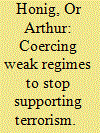

|
|
|
|
|
| Publication |
2013.
|
| Summary/Abstract |
Scholars tend to pessimistically argue that the weaker a regime is the harder it becomes for international actors to coerce it to fight the terrorist groups that it harbors/sponsors, since weak regimes are afraid that taking such an unpopular step could critically undermine their stability. Yet, this argument ignores the policy option that the coercing actor has of threatening to take steps which would undermine the stability of the weak regime unless it ceases its support for terrorist groups. Such a regime-threatening coercive strategy can overcome the problem of the weak regime's lack of political incentives because if the threat is credible, even a weak regime may conclude that it is politically cheaper to suppress the terrorists than face an externally triggered regime destabilization. Since weak regimes often care more about their survival than about national security interests, the regime-threatening coercive strategy has the best chances for success against such regimes. This article presents three different regime-threatening military coercive strategies and explores the conditions under which they are likely to be successful.
|
|
|
|
|
|
|
|
|
|
|
|
|
|
|
|
| 6 |
ID:
116404
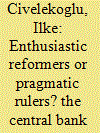

|
|
|
|
|
| Publication |
2012.
|
| Summary/Abstract |
This article examines the underpinnings of central bank (CB) reform in Turkey, with a focus on the role of external anchors, namely the European Union (EU) and the International Monetary Fund. It argues that although international actors played a substantial role in triggering CB reform in 2001, they failed to determine its parameters. The high costs of CB reform in the calculations of the ruling politicians allowed the Central Bank of the Republic of Turkey to gain partial operational autonomy, which fell short of fulfilling the Copenhagen criteria for accession to the EU. This article ends by arguing that due to the duration of high costs, the Bank continues to hold partial autonomy today.
|
|
|
|
|
|
|
|
|
|
|
|
|
|
|
|
| 7 |
ID:
133597
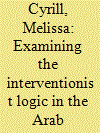

|
|
|
|
|
| Publication |
2014.
|
| Summary/Abstract |
At first glance, there was no coherent regional and international response to the transitions triggered in the Arab world since December 2010 as external players, both regional and international, had to confront with unceasing alarm the rapidity of change threatening to unravel in critical Arab states. However, as events in the region progressed, a pattern emerged to the external responses, one that was as predictive as it was differentiated. This was exemplified by the counter-revolutionary forces that were assembled against the transition in Bahrain on one hand, and the aggressively interventionist posture adopted towards Libya and Syria on the other. This inconsistency between activism and support for the supposedly democratic spirit of armed resistance groups, but inaction and silence towards the crushed non-violent public opposition elsewhere, clearly betrayed the interest-driven motivations of the external actors involved.
|
|
|
|
|
|
|
|
|
|
|
|
|
|
|
|
| 8 |
ID:
130998
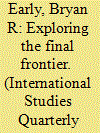

|
|
|
|
|
| Publication |
2014.
|
| Summary/Abstract |
While space capabilities were once concentrated among a handful of leading powers, an increasingly large number of states have gained access to them. As of 2007, 58 countries possessed dedicated civil space programs, 44 countries had placed nationally owned satellites into orbit, and 9 countries had achieved domestic space launch capabilities. To date, however, no systematic inquiries have ever been conducted into which countries acquire space capabilities and why. Within this paper, I develop an explanatory account that explores the capacity-based factors and political motivations that influence countries' acquisition of space capabilities. I test my hypotheses via a quantitative analysis of the factors affecting 143 countries' acquisition of civil space programs, satellite capabilities, and space launch capabilities from 1950 to 2002. My findings shed new light on the primary causes of the proliferation of civil space capabilities and yield a number of important policy implications
|
|
|
|
|
|
|
|
|
|
|
|
|
|
|
|
| 9 |
ID:
133651
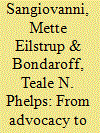

|
|
|
|
|
| Publication |
2014.
|
| Summary/Abstract |
We analyze forms of environmental activism that eschew the "information and socialization" politics typically associated with Transnational Advocacy Groups (TAGs) and instead favor direct, confrontational strategies, whose aim is to enforce international law. While mainstream TAGs typically seek influence through norm entrepreneurship, lobbying or "naming and shaming", what we label Direct Enforcement (DE) intervenes directly to halt (purportedly) illegal practices by states and private actors. DE activism has been most visible in transnational campaigns to protect endangered marine species, where environmental groups have resorted to damaging equipment used for illegal fishing and boarding fishing boats to enforce maritime conservation law. Often branded as eco-terrorism, such confrontational strategies have been largely ignored by scholarly literature on transnational activism. We contend that DE merits closer attention by IR-scholars for two reasons. First, DE activism plays an important role in enhancing the compliance pull of international laws in an area-the global environment-where states often lack capacity and political will to enforce international agreements. Second, an analysis of DE-activism provides important insights about issue selection and relative campaign success under different structural circumstances, thereby expanding our understanding of transnational advocacy more generally.
|
|
|
|
|
|
|
|
|
|
|
|
|
|
|
|
| 10 |
ID:
130911
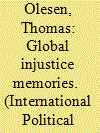

|
|
|
|
|
| Publication |
2012.
|
| Summary/Abstract |
Within a relatively short span of time, and culminating with the tenth anniversary of the genocide in 2004, the 1994 Rwanda genocide has become a key global injustice memory. At the core of this process is a double-sided conception of injustice: on the one hand, the genocide in itself clearly constitutes a major injustice; on the other hand, injustice claims have been expanded to encompass actors outside of Rwanda who observed the horrors without instigating sufficient action to halt, or at least mitigate the effects of, the unfolding genocide. It is the fact that moral and political responsibility for the genocide has been so powerfully expanded to third parties in a spectatorship position that most vividly testifies to the global character of the Rwanda injustice memory. The article identifies and analyzes four areas in which the transformation of the Rwanda genocide from national event to global injustice memory has occurred: institutionalization, expressions of regret, analogical bridging, and cultural products. The article argues that the transformation of non-Western events into global injustice memories has so far been insufficiently explored within International Relations and global political sociology.
|
|
|
|
|
|
|
|
|
|
|
|
|
|
|
|
| 11 |
ID:
125338
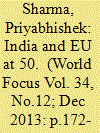

|
|
|
|
|
| Publication |
2013.
|
| Summary/Abstract |
As India EU ties entered into the golden jubilee in 2013 new themes have enriched the old bond. EU as an international actor has matured, expanded and reciprocated to the rise of India in 21st century world. EU is not only an economic actor but has a considerable appeal and an imperceptible process to fashion that appeal into something of an EU response and EU identity upon the member states and in that sense a Trans- Westphalian Actor.
|
|
|
|
|
|
|
|
|
|
|
|
|
|
|
|
| 12 |
ID:
097806
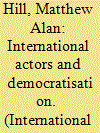

|
|
|
|
|
| Publication |
2010.
|
| Summary/Abstract |
Externally driven state-building is a complicated task that rarely fulfils the declared objectives of the international actors or the local state and society. This paper critiques the international dimension to state-building by examining USAID in Afghanistan and identifying the theoretical and practical explanations for its failure to aid democratic consolidation. Arguing that the Bush administration's democratisation efforts have had a negative impact on consolidating democracy, this paper identifies the democratic product of Afghanistan as characterised, at most, by having the formal institutions, routines and procedures of a democracy. I suggest that this merely 'formal' democratic product is too short-term and fails to take fully into account the need to develop a political and social culture capable of supporting democratic institutions. In terms of the future of democracy promotion in US foreign policy, I suggest that a change of emphasis may be occurring in the Obama administration.
|
|
|
|
|
|
|
|
|
|
|
|
|
|
|
|
| 13 |
ID:
133956
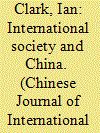

|
|
|
|
|
| Publication |
2014.
|
| Summary/Abstract |
The core suggestion of this article is that we make best sense of the concepts of power, legitimacy, and responsibility within a framework of international society. This framework is illustrated by, and applied to, the specific case of China's rise. In the light of its historical background, a rising China faces a major paradox. Seemingly, the prerequisite for it to exercise greater influence on the norms of international society is yet further assimilation into them: in order to become a respected norm maker, China must first be seen to be fully integrated as an appropriate norm taker. To be in a position to influence the norms of international society, China must seemingly firstly resolve any lingering ambiguities about its membership. In short, should the debates about China's status be understood as an expression of the power of norms (where China is assessed relative to some universal standard of responsibility), or are they better viewed as the deployment of the norms of power in such a way as to impact its social distribution to China's disadvantage (by imposing the self-interested standards of the liberal states)?
|
|
|
|
|
|
|
|
|
|
|
|
|
|
|
|
| 14 |
ID:
133940
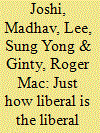

|
|
|
|
|
| Publication |
2014.
|
| Summary/Abstract |
This article assesses the extent to which the liberal peace (the dominant form of internationally supported peacemaking) actually deserves the sobriquet 'liberal peace'. In recent years, an intense debate emerged on this question as critics of the critique of the liberal peace have sought to downplay the dominance of the liberal peace. These debates are interesting but they are mainly based on qualitative analysis supplemented with some case study material, and often rely on assertions rather than evidence. This article seeks to add to this debate with simple aggregate data from the Peace Accords Matrix that is comprehensive and comparative. The article constructs a five-part framework to analyse the liberal elements of peace accords liberalism and then tracks the extent to which the elements of the framework are found in peace accords. Through this examination, it is found that the liberal peace is indeed the dominant form of peace-support intervention, although there are considerable variations in the extent and implementation of the liberalism in peacebuilding.
|
|
|
|
|
|
|
|
|
|
|
|
|
|
|
|
| 15 |
ID:
132945
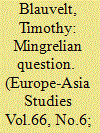

|
|
|
|
|
| Publication |
2014.
|
| Summary/Abstract |
Based on primary source materials from the Georgian Party archive and periodical press, this article examines the conflict between central and local elites in the Soviet Republic of Georgia over whether or not to grant linguistic and territorial rights to residents of one of its regions. The case demonstrates how the promises and aspirations of Soviet nationality policy were actually negotiated and interpreted on the local level in the early years of Soviet power, and how actors attempted to make use of nationality policy in order to mobilise the institutional resources available to them.
|
|
|
|
|
|
|
|
|
|
|
|
|
|
|
|
| 16 |
ID:
115031


|
|
|
|
|
| Publication |
2012.
|
| Summary/Abstract |
This article examines the reputational management strategies of national nongovernmental organizations (NGOs) involved in peace-building work in Sri Lanka between 2006 and 2007, a transitional period when the cease-fire was unraveling and the NGO sector was facing a "crisis of legitimacy." It traces the structural and proximate causes of the crisis and analyzes some of the ways in which NGOs were able to counteract the negative impacts that this criticism had on their legitimacy. This analysis challenges the mainstream view of NGO legitimacy as stable, unidimensional, and capacity-based by emphasizing the contested, highly politicized, and politically symbolic nature of NGO legitimacy in the Sri Lankan context. It also highlights the way in which national NGOs reframed and adapted peace-building agendas of international actors, challenging the popular view that liberal peace building functions hegemonically and that NGOs are compelled to follow the strategies of their international funders.
|
|
|
|
|
|
|
|
|
|
|
|
|
|
|
|
| 17 |
ID:
142880


|
|
|
|
|
| Summary/Abstract |
Altiero Spinelli’s 1967 article was an objective, logical analysis of Italian foreign policy and, at the same time, a manifesto for what had to be done and what he intended to foster and encourage. A small part of this he had already achieved by establishing the Istituto Affari Internazionali, in Rome, in 1965.
|
|
|
|
|
|
|
|
|
|
|
|
|
|
|
|
| 18 |
ID:
125128
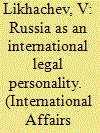

|
|
|
|
|
| Publication |
2013.
|
| Summary/Abstract |
THE DIALECTIC OF DEVELOPMENT of the international community, and the process of its identification in the conditions of the 21st century have objectively formulated the politico-intellectual demand for the knowledge of contemporary trends in geopolitics and geo-economics as a key element for efficient world governance. Every state has the right as an international actor and as a sovereign entity to its own vision of the evolution of international relations and to the determination of their regulatory mechanisms and priorities.
|
|
|
|
|
|
|
|
|
|
|
|
|
|
|
|
| 19 |
ID:
133112
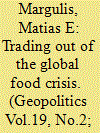

|
|
|
|
|
| Publication |
2014.
|
| Summary/Abstract |
The geopolitics of the Global Food Crisis and international trade has received limited scholarly attention, a significant omission given the major roles of the World Trade Organization (WTO) in structuring world food production and trade flows and as a principal inter-state governing mechanism of the global agro-food system. Analysing recent international policy actions framing the WTO as a 'fix' to the Global Food Crisis, this article points to the value of a critical geopolitics of agro-power sensitive to the spatial reconfiguration of production and power in the global agro-food system, problematising geospatial categories such as 'North' and 'South', and that takes seriously contests for control of geopolitical agents such as the WTO.
|
|
|
|
|
|
|
|
|
|
|
|
|
|
|
|
| 20 |
ID:
132701
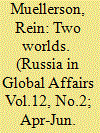

|
|
|
|
|
| Publication |
2014.
|
| Summary/Abstract |
International law doesn't work well in in a world with unipolar tendencies and when its interpretation is dictated from a unipolar center. But the world is simply too big, complex and diverse for that.
There are many causes of the current conflict in and around Ukraine. Due to the presence of all-pervading corruption that since 1991 has constantly increased from President to President, from administration to administration, and the absence of any meaningful efforts to bridge the potentially explosive historical, religious, ethnic and geographic divides of the country, Ukraine was on the edge of becoming a failed state even before it finally exploded on the Maidan. Neither the Ukrainian political elite nor those external actors, which have supported or continue to support the respective governments or oppositions, have ever acted in the best interests of the Ukrainian people as a whole.
|
|
|
|
|
|
|
|
|
|
|
|
|
|
|
|
|
|
|
|
|